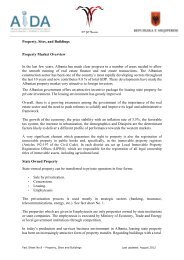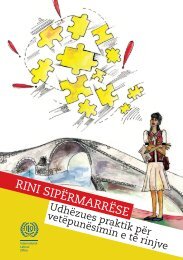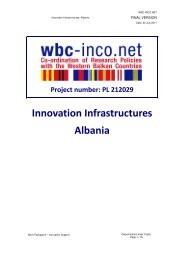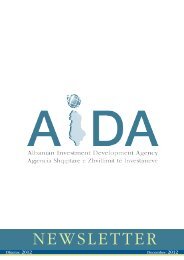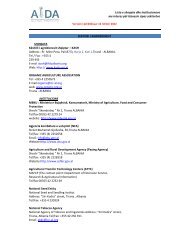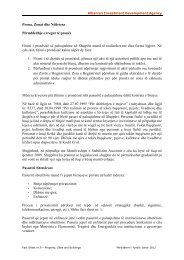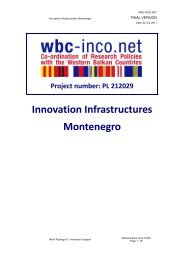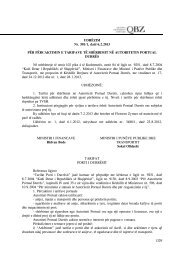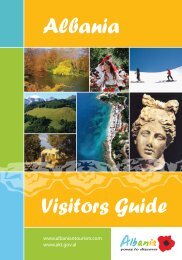Education System, Skills and Strategies - AIDA
Education System, Skills and Strategies - AIDA
Education System, Skills and Strategies - AIDA
You also want an ePaper? Increase the reach of your titles
YUMPU automatically turns print PDFs into web optimized ePapers that Google loves.
<strong>Education</strong> <strong>System</strong>, <strong>Skills</strong> And <strong>Strategies</strong> Albanian Investment Development Agency 15<br />
Blvd. Gjergj Fishta, Pall. Shllvareve, Tiranë<br />
Tel: +355 4 2251001, e-mail: info@aida.gov.al website: www.aida.gov.al<br />
<strong>Education</strong> <strong>System</strong>, <strong>Skills</strong> <strong>and</strong> <strong>Strategies</strong><br />
<strong>Education</strong>al <strong>System</strong> in Albania<br />
<strong>Education</strong> in the Republic of Albania is public <strong>and</strong><br />
private. According to the Ministry of <strong>Education</strong> <strong>and</strong><br />
Science, the private education must be in accordance<br />
with the rules <strong>and</strong> regulations set forth by the Ministry<br />
of <strong>Education</strong> <strong>and</strong> Science. The structure of the<br />
<strong>Education</strong> <strong>System</strong> in the Republic of Albania is divided<br />
into the following:<br />
• Pre-school education<br />
• Basic education (primary level, lower secondary,<br />
special education)<br />
• Upper Secondary education (secondary schools,<br />
vocational education, social-cultural education)<br />
• Higher education<br />
• Adult education<br />
Compulsory<br />
25<br />
Post-graduate <strong>Education</strong><br />
24<br />
23<br />
22<br />
Higher <strong>Education</strong> - University<br />
21<br />
20<br />
19 XIII<br />
18 XII Comprehensive Vocational/<br />
17 XI Secondary Technical<br />
16 X <strong>Education</strong> <strong>Education</strong><br />
15 IX<br />
14 VIII<br />
13 VII<br />
Upper Primary<br />
12 VI <strong>Education</strong><br />
11 V<br />
10 IV<br />
9 III<br />
8 II<br />
Lower Primary<br />
7 I<br />
<strong>Education</strong><br />
6<br />
5 Pre-school<br />
4<br />
<strong>Education</strong><br />
Age Grade<br />
Basic <strong>Education</strong><br />
Higher<br />
Non-<br />
University<br />
<strong>Education</strong><br />
Art &<br />
Social<br />
School*<br />
The aim of the compulsory basic education is to provide<br />
students with intellectual, creative, practical <strong>and</strong> physical<br />
skills; develop their personality <strong>and</strong> offer key elements<br />
of general culture <strong>and</strong> civilized behavior. Compulsory<br />
basic education starts at the age of 6 <strong>and</strong> lasts no less<br />
than 9 years.<br />
According to Article no.10 of Law no.7952, dated “Preuniversity<br />
education law”, changed, students from minority<br />
groups (Greek, Macedonian, etc.), have a right to<br />
study in their native language <strong>and</strong> learn about the history<br />
<strong>and</strong> culture of their own country, within the framework<br />
of the plans <strong>and</strong> programs of the educational programs<br />
approved from Ministry of <strong>Education</strong> <strong>and</strong> Science.<br />
Secondary <strong>Education</strong><br />
Secondary General <strong>Education</strong> provides a general culture<br />
that is exp<strong>and</strong>ing <strong>and</strong> deepening the culture <strong>and</strong><br />
knowledge gained through basic education. General<br />
secondary schools may design educational programs<br />
to enable students to acquire knowledge, skills, <strong>and</strong><br />
abilities for personal preparation necessary for studies<br />
in high school or for a specific professional training.<br />
The duration of general secondary education<br />
lasts three years.<br />
Professional <strong>Education</strong> prepares the next generation<br />
of skilled workers. To strengthen the professional<br />
education system the Ministry of <strong>Education</strong> <strong>and</strong><br />
Science has undertaken significant reforms in recent<br />
years. Professional education may last minimum of<br />
two years <strong>and</strong> a total of four years. On completion<br />
of each level, (2+1+1) the student is certified <strong>and</strong> decides<br />
to move to the next level of professional training<br />
or starts working. In the case of technical education,<br />
the program lasts four years.<br />
After completing secondary education (general or<br />
professional) students can begin post-secondary professional<br />
education lasting 1-2 years.<br />
Foreign Languages Secondary Schools are an integral<br />
part of secondary education, with a duration of three<br />
years, <strong>and</strong> aim to provide more in depth teaching in<br />
one (or more) foreign languages, in addition to the<br />
general curriculum.<br />
While, Bilingual training sections provide bilingual<br />
education school of students in two languages (mother<br />
tongue <strong>and</strong> a foreign language). Bilingual school sections<br />
have a three year period <strong>and</strong> their performance is<br />
based on bilateral agreements (ex. agreement with the<br />
Italian government, French <strong>and</strong> German)
16<br />
Albanian Investment Development Agency<br />
<strong>Education</strong> <strong>System</strong>, <strong>Skills</strong> And <strong>Strategies</strong><br />
Blvd. Gjergj Fishta, Pall. Shllvareve, Tiranë<br />
Tel: +355 4 2251001, e-mail: info@aida.gov.al website: www.aida.gov.al<br />
Secondary education in the area of arts or sports is<br />
an additional opportunity given to gifted or talented<br />
students, i.e. students who have specific abilities in<br />
areas such as arts, choreography or sports. Arts <strong>and</strong><br />
Sports Secondary schools are of three or four years<br />
duration, depending on the branch of study.<br />
Higher <strong>Education</strong><br />
Following the adoption of the Bologna Declaration<br />
in 18 September 2003, the Albanian higher education<br />
was involved in a process of reform <strong>and</strong> restructuring,<br />
aligned with the Bologna process.<br />
These developments fully comply with the National<br />
Strategy on Higher <strong>Education</strong> 2008-2013 (SKALA),<br />
which also encapsulates the proposals of the Albanian<br />
Government on strategic policies for Higher <strong>Education</strong><br />
development for the 10 coming years.<br />
As in all European Union Countries, The Higher <strong>Education</strong><br />
system in Albania includes Universities, Academies,<br />
Professional Colleges, Higher Schools <strong>and</strong><br />
Inter-University Centers, offering accredited study<br />
programs.<br />
According to the Public Accreditation Agency For<br />
Higher <strong>Education</strong> (APAAL) 1 , the system of Higher <strong>Education</strong><br />
Institutions consists of 14 public <strong>and</strong> 47 non<br />
public, <strong>and</strong> the Centre for Albanology Studies.<br />
Forms of study in the Higher <strong>Education</strong> Institutions<br />
are: Full-time learning, part-time learning <strong>and</strong> distance<br />
learning.<br />
Statistical Data on the Numbers of Students<br />
<strong>and</strong> Students<br />
Table 1<br />
140000<br />
120000<br />
100000<br />
80000<br />
60000<br />
40000<br />
20000<br />
0<br />
Source: INSTAT<br />
Nr of students in higher education<br />
2004/05 2005/06 2006/07 2007/08 2008/09 2009/10<br />
Table 1 provides statistical data on the numbers<br />
of students in the <strong>Education</strong>al system in Albania<br />
during school/academic years 2004-2010.<br />
There is an increase in the numbers of students enrolled<br />
in the higher education over the last four years.<br />
For 2007 – 2010 The Ministry of <strong>Education</strong> <strong>and</strong><br />
Science is implementing the program “Quality <strong>and</strong><br />
Equality in <strong>Education</strong>.” The program’s aim was to<br />
offer equal opportunities <strong>and</strong> chances to all -particularly<br />
to the marginalized levels of society-to<br />
attend basic education. The Ministry of <strong>Education</strong><br />
<strong>and</strong> Science drafted this year a National Action<br />
Plan to reduce to zero school dropout rates in the<br />
Basic <strong>Education</strong>.<br />
<strong>Strategies</strong> for all levels education development<br />
envisage achieving the following over the 4 forthcoming<br />
years:<br />
- Provide every pupil completing the 9-year<br />
education with an opportunity to attend secondary<br />
education;<br />
- Increase the numbers of students attending<br />
vocational education by at least 10%;<br />
- Increase the numbers of students by 10% every<br />
year; to reach an amount of 150 000 students<br />
in the Academic year 2013-2014;<br />
- Increase the numbers attending private education<br />
by at least 2% of the total numbers of<br />
students <strong>and</strong> students;<br />
Data on public funding in education for<br />
the recent years:<br />
According to the Ministry of <strong>Education</strong> <strong>and</strong> Science,<br />
public funding in education has shown an<br />
average annual increase rate of 11%; or 370.9 million<br />
EUR. In 2009 this funding accounts for 3.7%<br />
of the GDP. In absolute amount, the public funding<br />
has augmented around 3 times between 2000<br />
<strong>and</strong> 2009.<br />
This positive trend of public funding is sustainable,<br />
(according to mid-term predictions for 2010<br />
-2012) <strong>and</strong> is a result of the goal of matching the<br />
ratio public funding in education/GDP to that of<br />
other countries of the Region or of the EU. The<br />
proportion of public <strong>and</strong> private financed expenditure/GDP<br />
on education in 2009 reached a percentage<br />
of 4.5%<br />
1<br />
www.aaal.edu.al
<strong>Education</strong> <strong>System</strong>, <strong>Skills</strong> And <strong>Strategies</strong> Albanian Investment Development Agency 17<br />
Blvd. Gjergj Fishta, Pall. Shllvareve, Tiranë<br />
Tel: +355 4 2251001, e-mail: info@aida.gov.al website: www.aida.gov.al<br />
An average of 18% of public funding on education<br />
is allocated to the Secondary <strong>Education</strong> (general<br />
<strong>and</strong> vocational); 19% of the funds have gone to the<br />
Higher <strong>Education</strong>.<br />
Measures to integrate young people into<br />
the job market or higher education <strong>and</strong><br />
VET, including educational <strong>and</strong> vocational<br />
guidance.<br />
Pursuant to the relevant legal framework, the right<br />
to employment <strong>and</strong> continuing education <strong>and</strong><br />
training is guaranteed for all. Upon completion<br />
of the 9-year (compulsory) basic education, every<br />
young person reaching the age of 16 has the right<br />
to get an employment, in compliance with rights<br />
<strong>and</strong> obligations set forth in the Labor Code of the<br />
Republic of Albania.<br />
Having an employment or not, all are entitled to<br />
attend part-time secondary or higher education,<br />
or continuing training offered by the Professional<br />
Training <strong>System</strong>. Most of the young people, According<br />
to MES (around 90% of them) attend secondary<br />
education (either general or vocational).<br />
Students completing the General Secondary <strong>Education</strong><br />
(GSE), have several opportunities:<br />
- To be employed, without having gained any<br />
professional qualification first;<br />
- Carry on with higher university education<br />
studies;<br />
- Continue studies in the post-secondary cycle<br />
with an aim of gaining a vocational qualification;<br />
- Attend vocational training courses.<br />
Most of the students (around 76% in 2008) who<br />
successfully complete the GSE pursue their studies<br />
in the Higher <strong>Education</strong> Universities.<br />
Higher <strong>Education</strong><br />
The monitoring <strong>and</strong> assessment mechanisms for<br />
education institutions in the HE system are:<br />
- The internal assessment units ensuring quality<br />
at higher education institutions;<br />
- The Public Agency for the Accreditation of<br />
Higher <strong>Education</strong> (PAAHE) <strong>and</strong> the Accreditation<br />
Council (AC);<br />
- The Council for Higher <strong>Education</strong> <strong>and</strong> Science<br />
(CHES);<br />
- The MES, respectively the Auditing Directorate<br />
<strong>and</strong> the Sector for Curriculum <strong>and</strong> Quality<br />
Assessment with this Ministry.<br />
Higher education institutions are responsible<br />
for ensuring <strong>and</strong> assessing internal quality. To this<br />
end, they set up relevant units composed by members<br />
of the academic staff, one representative of<br />
student organizations within the institution <strong>and</strong> one<br />
external expert.<br />
PAAHE is the public agency responsible for the<br />
accreditation of study programs, ensuring <strong>and</strong> conducting<br />
an external assessment of quality at higher<br />
education institutions, <strong>and</strong> it functions in an autonomous<br />
fashion.<br />
Accreditation Council (AC) functions as a collegial<br />
body of PAAHE <strong>and</strong> submits recommendations by<br />
the evaluation reports. AC is independent body <strong>and</strong><br />
makes its recommendations public. Its members<br />
serve a 5-year term <strong>and</strong> they are nominated by the<br />
Minister of <strong>Education</strong> <strong>and</strong> Science after a competition.<br />
Evaluation <strong>and</strong> accreditation are based on state quality<br />
st<strong>and</strong>ards, which are based on guidelines of quality<br />
assurance of higher education in European space.<br />
They are sanctioned by the laws of MES following<br />
proposals from PAAHE <strong>and</strong> CHES.<br />
Monitoring <strong>and</strong> evaluation of quality is carried out<br />
for each program of study <strong>and</strong> any institution of<br />
higher education diplomas issued before the first,<br />
<strong>and</strong> this process is done periodically every six<br />
years. Procedures, requirements, criteria <strong>and</strong> st<strong>and</strong>ards<br />
for monitoring, evaluation <strong>and</strong> accreditation<br />
are the same for public <strong>and</strong> private institutions of<br />
higher education.<br />
CHES is the advisory body of the Ministry of <strong>Education</strong><br />
<strong>and</strong> the Council of Ministers for development<br />
policies in higher education, research <strong>and</strong><br />
technological development in the country.
18<br />
Albanian Investment Development Agency<br />
<strong>Education</strong> <strong>System</strong>, <strong>Skills</strong> And <strong>Strategies</strong><br />
Blvd. Gjergj Fishta, Pall. Shllvareve, Tiranë<br />
Tel: +355 4 2251001, e-mail: info@aida.gov.al website: www.aida.gov.al<br />
Statistics on ICT use in education <strong>and</strong> training,<br />
including the number of students per<br />
computer <strong>and</strong> distance learning facilities<br />
In 2005, the Master Plan was drafted for the Albanian<br />
program on e-schools, which was implemented<br />
between 2005 <strong>and</strong> 2009. In support of this Plan,<br />
on 19.12.2005 a Memor<strong>and</strong>um of Underst<strong>and</strong>ing<br />
with the United Nations Development Program was<br />
signed for assistance in the technical management<br />
of the plan.<br />
During 2007-2009 the government made priority investments<br />
on IT in schools. According to MES by<br />
the end of 2008-2009 academic school year, the situation<br />
was as follows:<br />
- Basic education 2,7 %;<br />
- Basic Secondary <strong>Education</strong> 5,3 %;<br />
- Proffesional <strong>Education</strong> 7,7 %.<br />
Students receive a professional degree maturity<br />
entitled “ICT Technician.” Another form of incorporating<br />
ICT is integrated through the content of<br />
teaching in different subjects, or specific professional<br />
practices.<br />
These include “technical drawing software” <strong>and</strong><br />
teaching practices called “teaching office”, applied<br />
in occupational fields such as “economy-businesses”,<br />
“hotels”, “agricultural business”, etc..<br />
Teaching of the official languages of the European<br />
Union<br />
The Albanian education system offers foreign languages<br />
teaching starting with 3 rd grade children in<br />
public elementary education <strong>and</strong> 1 st grade in private<br />
elementary education until university. Foreign language<br />
in basic education (3 rd – 9 th grade) is taught by<br />
foreign language teachers graduated in the HEI of the<br />
Republic of Albania.<br />
Higher education in the Republic of Albania offers<br />
the instruction of these foreign languages: English,<br />
French, German, Italian, Spanish, Russian, Turkish<br />
<strong>and</strong> Greek. Upon completion of their studies, students<br />
graduate in various fields as foreign language<br />
teachers, specialists or foreign language translators<br />
for the languages above.<br />
Number of students who learn foreign languages in<br />
primary education (3 rd - 9 th grade)<br />
Table 3<br />
Foreign<br />
Languages<br />
Source: MES official statistics 2009-2010<br />
Table 4<br />
Foreign<br />
Languages<br />
Elementary<br />
3 rd – 5 th<br />
grade (PC)<br />
General<br />
High<br />
School<br />
Secondary<br />
6th - 11th<br />
(SC)<br />
Professional<br />
<strong>Education</strong><br />
(PE)<br />
PC<br />
%<br />
General<br />
High<br />
School %<br />
Source: Official statistics of the Ministry of <strong>Education</strong> <strong>and</strong> Science<br />
2009-2010<br />
PE<br />
%<br />
English 70,402 12,627 77.6 77.2<br />
French 14,671 2,260 16.2 13.8<br />
Italian 5,438 1,351 6.0 8.3<br />
German 203 112 0.2 0.7<br />
Total 90,714 16,350 100 100<br />
SC<br />
%<br />
English 95,380 147,139 82.4 78.5<br />
French 15,583 31,642 13.4 17<br />
Italian 4,762 8,482 4.2 4.5<br />
Total 115,725 187,263 100 100<br />
Number of students who learn foreign languages in<br />
upper secondary education (10 th – 13 th grade)<br />
In our country there are two specialized academic<br />
structures in teaching <strong>and</strong> graduate training in various<br />
stages of study of foreign languages: Faculty of<br />
Foreign Languages at the University of Tirana, Faculty<br />
of Foreign Languages at the University of Shkodra.<br />
Five other universities have Departments of Foreign<br />
Languages, where students graduate in English, Italian,<br />
French, German <strong>and</strong> Greek. Duration of study<br />
differs from their study cycles according to the Bologna<br />
process.<br />
The Higher <strong>Education</strong> Institutions (HEI’s)<br />
<strong>and</strong> the Research Institutions<br />
There are about 5000 students studying computer sciences,<br />
information technology <strong>and</strong> other relevant sciences<br />
in the public HEI’s. In the academic year 2009-<br />
2010, there were 1668 students admitted in the said<br />
study programs.
<strong>Education</strong> <strong>System</strong>, <strong>Skills</strong> And <strong>Strategies</strong> Albanian Investment Development Agency 19<br />
Blvd. Gjergj Fishta, Pall. Shllvareve, Tiranë<br />
Tel: +355 4 2251001, e-mail: info@aida.gov.al website: www.aida.gov.al<br />
Table 8 – Students admitted in the IT sciences<br />
No. Study<br />
Programs<br />
1<br />
Electronic<br />
Engineering<br />
Number of students<br />
admitted<br />
in the first year<br />
for 2009-2010<br />
(1st cycle)<br />
107 599<br />
2 Informatics 504 1328<br />
3<br />
4<br />
Math<br />
Engineering<br />
<strong>and</strong> Informatics<br />
Economic<br />
Informatics<br />
100 425<br />
87 315<br />
5 IT Engineering 146 540<br />
6<br />
7<br />
8<br />
9<br />
Geo-informatics<br />
Engineering<br />
Information<br />
Technology<br />
Computer<br />
network<br />
engineering<br />
Math &<br />
Informatics<br />
84 355<br />
351 571<br />
80 297<br />
209 309<br />
Total 1668 4739<br />
Source: Ministry of <strong>Education</strong> <strong>and</strong> Science<br />
Total number<br />
of students in<br />
2009-2010<br />
(1st, 2nd cycle,<br />
1st level Master)<br />
The measures taken to prevent poverty <strong>and</strong><br />
social exclusion of young people.<br />
The main document for the prevention of poverty<br />
<strong>and</strong> social exclusion in young people is about social<br />
inclusion strategy for 2007 - 2013, which has special<br />
focus on poverty <strong>and</strong> social exclusion, as they<br />
are risks that remain, even after economic growth.<br />
Among the measures taken to prevent poverty <strong>and</strong><br />
social exclusion of their own, there are projects related<br />
to vocational training <strong>and</strong> qualification categories,<br />
in order to help them cope with the challenges of the<br />
labor market.<br />
Another important measure is the opening of the<br />
youth employment in the employment offices. This<br />
will serve young people, their job orientation <strong>and</strong><br />
training, <strong>and</strong> it also includes online services.<br />
In addition, under the joint program between the United<br />
Nations <strong>and</strong> the Government of Albania: “Youth Employment<br />
<strong>and</strong> Migration: Increasing the benefits <strong>and</strong> reduce<br />
risks,” a number of measures have been taken in<br />
view of reducing poverty <strong>and</strong> youth professional formation,<br />
by promoting employment <strong>and</strong> minimize irregular<br />
migration, especially for disadvantaged youth from rural<br />
areas of the District of Shkodra <strong>and</strong> Kukes.<br />
Among the main measures for the years 2010-2011 are:<br />
- Strengthening of professional training, including<br />
disadvantaged persons <strong>and</strong> other vulnerable categories;<br />
- Increasing cooperation with the private sector<br />
regarding employment groups in need;<br />
- Plans to open offices in the youth employment<br />
offices.<br />
Ministry of <strong>Education</strong> <strong>and</strong> Science <strong>and</strong> Ministry of<br />
Labor, Social Affairs <strong>and</strong> Equal Opportunities, in cooperation<br />
with the German organization GiZ (German<br />
Society for International Cooperation GmbH.),<br />
have organized competitions to promote business<br />
projects through grants to young people, for those<br />
who completed secondary professional education.<br />
This model will be extended to students who complete<br />
their studies in technical, technological agricultural<br />
science, etc.., In order to encourage <strong>and</strong><br />
promote self employment <strong>and</strong> skills associated with<br />
entrepreneurship.<br />
Access to <strong>Education</strong> of EU Citizens<br />
Based on data of the MES, the number of the foreign<br />
citizens from the EU countries (including the foreign<br />
diplomats), who are residing in Albania, is 543.<br />
They are mainly from Greece, Italy, Germany, etc..<br />
The education of the children of the foreign citizens<br />
is provided in the Article 11, paragraph 11.2 of the<br />
Law No. 7952, of 21.06.1995 “On pre-university education”,<br />
amended by the Law No. 8387, of 30.07.1998,<br />
which provides that: “the rights of the foreign citizens<br />
to education in the public educational institutions in<br />
the Republic of Albania is defined in the sub-laws issued<br />
by the Ministry of <strong>Education</strong> <strong>and</strong> Science”.<br />
Albanian language courses for foreigners are offered<br />
at the Department of Albanian Language <strong>and</strong><br />
Literature at the Faculty of History Philology of the<br />
University of Tirana.



